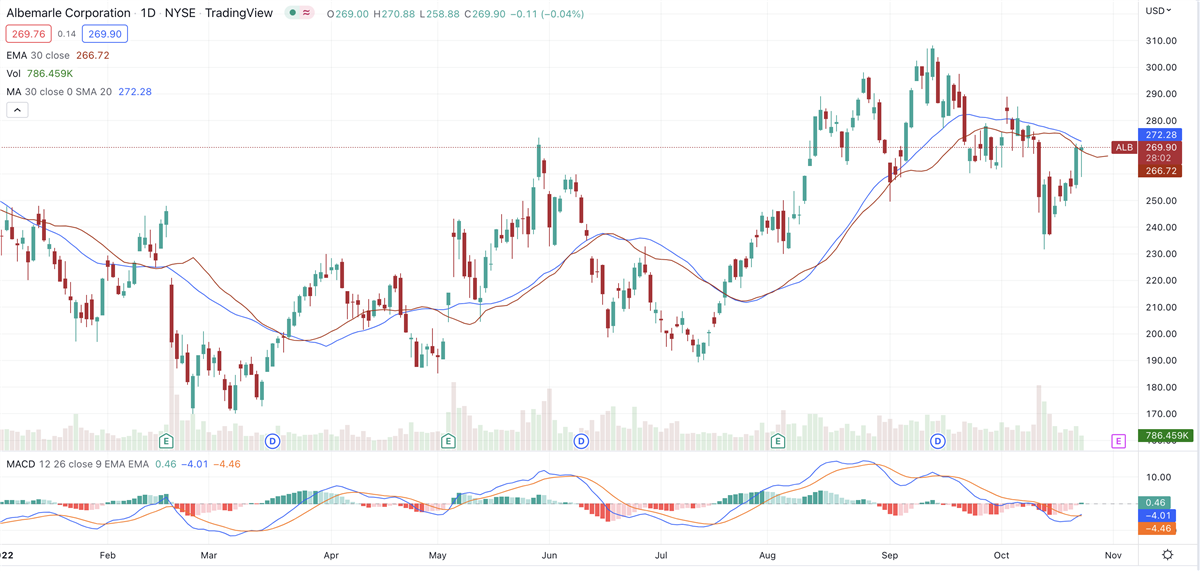
Wall Street has high expectations for lithium miners, including S&P 500 component Albemarle (NYSE: ALB), which reports its third quarter on November 2 after the bell.

MarketBeat.com – MarketBeat
The stock is up 19.86% in the past three months, and up 16.01% year-to-date. It also rallied a whopping 13.70% in the past week. That recent rally tracked the broader market, although Albemarle outpaced its index by a wide margin, as the S&P 500 advanced 4.66% for the week.
Other U.S.-listed lithium stocks, including Sociedad Química y Minera de Chile (NYSE: SQM), Piedmont Lithium Limited (NASDAQ: PLL), Livent Corporation (NYSE: LTHM) and Lithium Americas Corporation (NYSE: LAC) also outperformed the broader market last week.
Those moves came even as Tesla (NASDAQ: TSLA) missed third-quarter revenue expectations. Nonetheless, the stock advanced 4.61% last week, just slightly less than its index.
Even with more bad news from Tesla, including a price drop on cars in China as demand weakens, the future looks bright for EVs and companies involved in the lithium industry.
Analysts predict a strong market for lithium in the next 8 years. For example, global consulting firm McKinsey says lithium demand will rise from around 500,000 metric tons of lithium carbonate equivalent (LCE) in 2021 to between three million and four million metric tons in 2030.
It’s pretty clear that lithium producers and battery makers, like Norway’s Freyr Battery (NYSE: FREY), are well positioned for big gains going forward. But there are more immediate reasons for optimism.
One development driving Albemarle’s advance last week: The Charlotte-based company is the beneficiary of a U.S. Department of Energy grant to increase lithium processing capabilities.
The grant is part of a wider program, under which the DOE awarded a total of $2.8 billion to develop lithium processing facilities in 12 states. Albemarle received $150 million as one of the early projects funded by the Infrastructure Law.
In a release, Albemarle says it will use the grant “to expand domestic manufacturing of batteries for electric vehicles (EVs) and the electrical grid and for materials and components currently imported from other countries.”
Albemarle plans to build a new commercial-scale lithium concentrator facility in Kings Mountain, North Carolina.
In the press release, company CEO Kent Masters noted that Albemarle is among only a few companies “currently producing battery-grade lithium from U.S. resources.”
The company previously announced another new lithium conversion facility, for which it’s still selecting a site. According to the company, this new facility “is expected to eventually produce up to 100,000 metric tons of battery-grade lithium per year to support domestic manufacturing of up to 1.6 million EVs per year.”
When Albemarle reports next week, analysts expect earnings of $6.84 per share on revenue of $2.12 billion. Those would be increases of more than 550% and 155%, respectively. For the full year, Wall Street sees Albemarle earning $21.14 per share, a year-over-year gain of 423%.
Albermarle’s chart shows a consolidation that began in mid-September after the stock pulled back from a high of $308.24. On October 13, as the broader market staged a stunning upside reversal, Albemarle found support at its 200-day moving average. Although the stock still ended the week ended October 14 with a loss, that rebound kickstarted last week’s uptrend.
Even so, Albemarle remains below its 50-day moving average, although that line is turning higher, which is a lagging indicator of a stock’s momentum. Albemarle is trading above shorter-term lines, including its 10-day and 21-day averages.
With the company due to report earnings next week, investors should use caution. Even slightly reduced guidance or a surprise miss can send a stock lower. Opting to wait until after earnings, even if it rockets higher on a better-than-expected report, can result in a profitable trade over the medium term. A big price increase after earnings is generally a signal that institutional investors have conviction in a stock and are getting in at what they believe will eventually prove to be a reasonable valuation.
